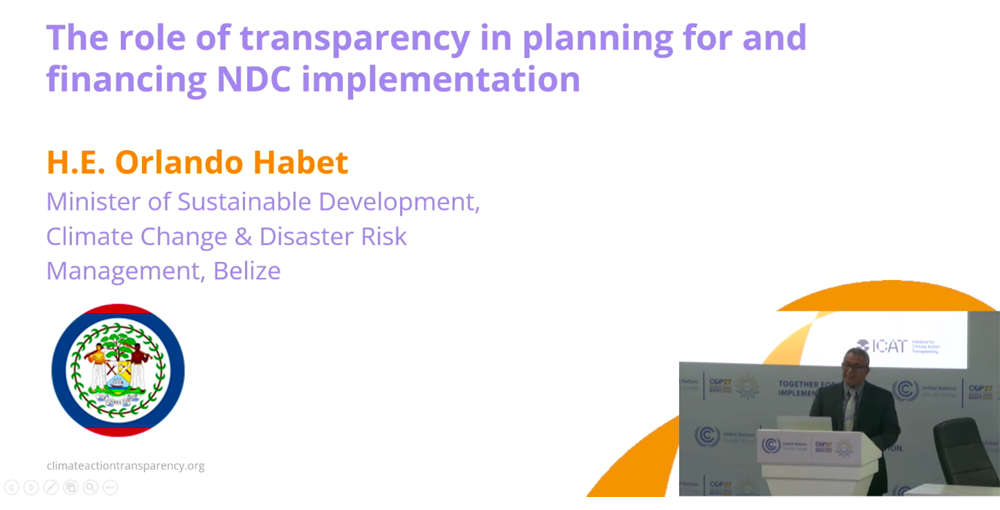During a side event organized by the Government of Nigeria, the ICAT, and the CCAP, Minister Habet said transparency improves climate finance decision-making, adding that developing countries “must be ready to be transparent.”
by Marco Lopez
SHARM EL-SHEIKH, Egypt, Mon. Nov. 14, 2022
This morning, a keynote address on the role of transparency in climate finance was delivered by Minister Orlando Habet at COP27 during a side event organized by the Initiative for Climate Action Transparency (ICAT), the Center for Clean Air Policy (CCAP) and the government of Nigeria. Min. Habet outlined during the address that clarity and transparency on climate finance are key to driving the urgent implementation of climate action, and he referred to transparency in climate finance as a “360-degree phenomenon.”
Habet made a call for developing countries to be prepared to be transparent to make our financial needs clear in order to address financing gaps in vulnerable states, and noted that such transparency will guide decision-making and foster mutual trust as various stakeholders make efforts to urgently take action to address climate change impacts.
“We as developing countries must be ready to be transparent so that all stakeholders know our climate finance needs, how much we received, how we have used it, and the gaps in climate finance. But it is also important that developed countries with historical responsibilities also step up with their transparency initiatives on delivering climate finance targets,” Min. Habet said during his remarks.
At COP27, discussions on climate finance are dominating the talks, and Min. Habet has been advocating for, “the definition of climate finance, the New Collective Quantified Goal, and commitments for long-term finance which are under negotiations during this COP.” He said during his remarks that, “alongside the negotiations, it is important that we have discussions, and deliberations, sharing our lessons and plans on climate finance transparency issues so that it reinforces the efforts.”
He drew attention to Belize’s case, and the highly vulnerable situation in which the country remains—pointing to the damage recently caused by Hurricane Lisa as just a “fraction of the impact” and highlighting how the extended drought in 2018 began to reduce our economic growth even before the COVID-19 pandemic.
“It also brought our economic growth to a negative trajectory, which was later amplified by the pandemic. Amidst all the economic hardships, Belize updated the NDC [nationally determined contributions] targets with a higher ambition by broadening their coverage and depth. We have estimated the total cost of implementation until 2030 as US$1.9bn, out of which we have secured finances of approximately US$ 300 million. Belize has the daunting task of securing this broad gap in climate finance of US$1.6bn. Moreover, this figure does not account for the potential incremental nature of climate change impacts, and human and institutional capacity enhancement requirements,” explained Minister Habet.
Despite this, he stated that Belize continues to strengthen its local institutional architecture and climate finance-related systems and partnerships on the climate finance frontier, collaborating with the ICAT since 2019, and other groups like the Commonwealth Climate Finance Access Hub on climate finance and transparency issues.
Minister Habet was joined by the Minister of Environment for Nigeria, Mohammed Abdullahi, and the CEO of his ministry, Kenrick Williams, also sat on the panel today.

